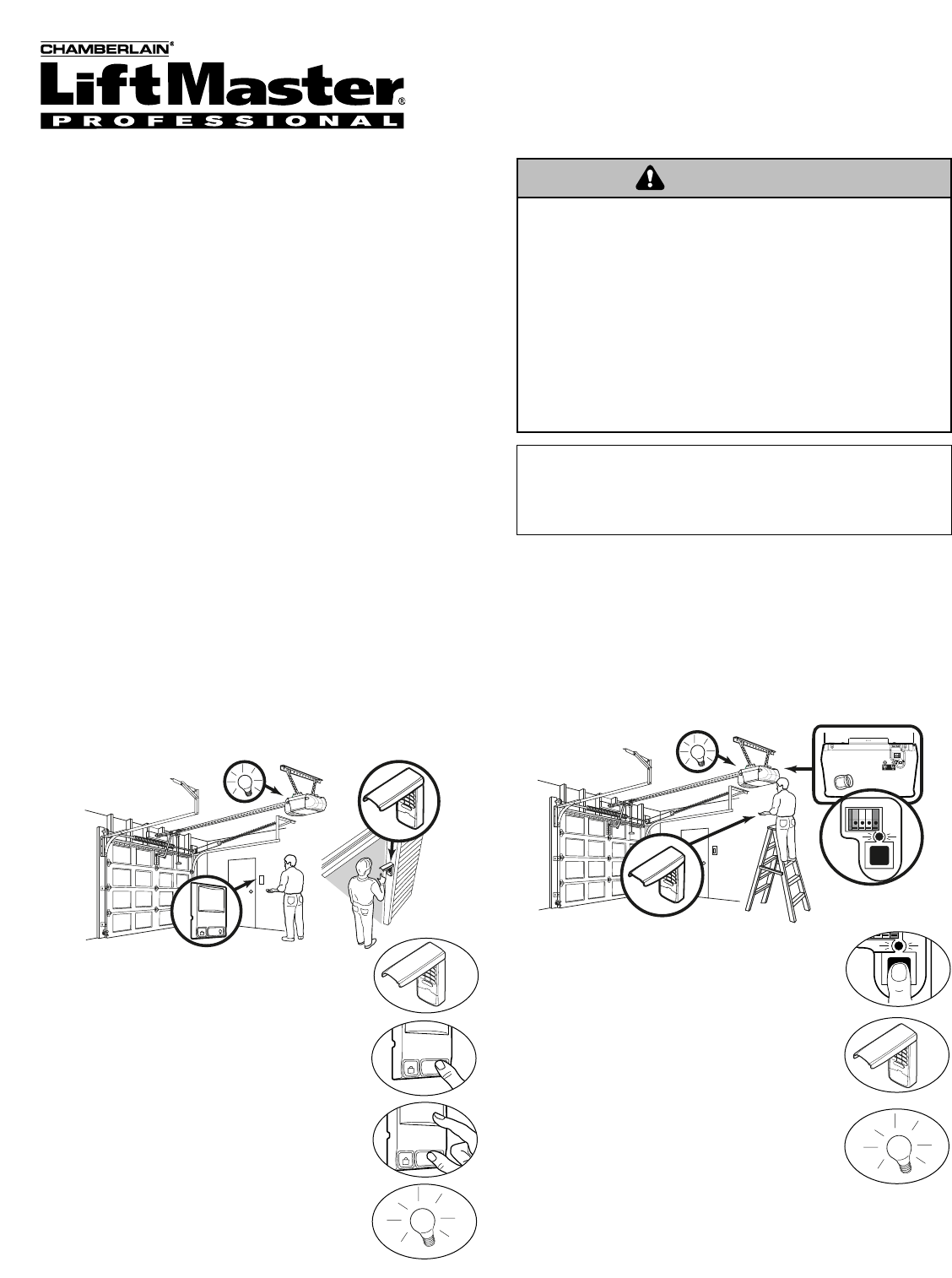FEATURES
For use with any 315 MHz SECURITY✚
®
garage door openers
having a purple “learn” button.
Personalized Password: Up to 10,000 possible combinations.
Password can be easily changed if desired.
Temporary Password: Can be added for visitors or service
persons. This temporary password can be limited to a
programmable number of hours or a programmable number of
entries.
Rolling Code: While your password remains constant until you
change it, the code between the Keyless Entry and the receiver
changes with each use, randomly accessing over 100 billion
new codes.
Operation: Opener activates when 4-digit password and
ENTER button is pressed.
If wrong numbers are accidentally pressed, correction can be
made immediately. The ENTER button will transmit only the last
four digits.
The keypad will blink for 15 seconds after the password is
transmitted. During that time the ENTER button can be used to
stop or reverse the door travel.
The Lock feature on openers with Multi-Function Door Controls
is designed to prevent operation of the door from portable
transmitters. However, the door will open and close from the
door control push button and the Keyless Entry.
One Button Close: Opener can be closed by pressing only the
ENTER button if the one button close feature has been
activated. This feature has been activated at the factory. To
activate or deactivate this feature press and hold buttons 1 and
9 for 10 seconds. The keypad will blink twice when the one
button close is active. The keypad will blink four times when one
button close is deactivated.
1
Models 377LM, 377LMC
315 MHz Security✚
®
Wireless Keyless Entry
To prevent possible SERIOUS INJURY or DEATH from a moving
gate or garage door:
• Install Keyless Entry Control within sight of the garage door, out of
reach of children at a minimum height of 5 feet (1.5 m), and away
from all moving parts of door.
• ALWAYS keep remote controls out of reach of children. NEVER
permit children to operate, or play with remote control
transmitters.
• Activate gate or door ONLY when it can be seen clearly, is properly
adjusted, and there are no obstructions to door travel.
• ALWAYS keep gate or garage door in sight until completely closed.
NEVER permit anyone to cross path of moving gate or door.
1. Enter a four digit personal identification
number (PIN) of your choice on the keypad.
Then press and hold ENTER.
2. While holding the ENTER button, press and
hold the LIGHT button on the Multi-Function
Door Control.
3. Continue holding the ENTER and LIGHT
buttons while you press the push bar on the
Multi-Function Door Control (all three buttons
are held).
4. Release buttons when the motor unit lights
blink. It has learned the code. If light bulbs
are not installed, two clicks will be heard.
1. Press and release the “learn” button on motor
unit. The learn indicator light will glow
steadily for 30 seconds.
2. Within 30 seconds, enter a four digit personal
identification number (PIN) of your choice on
the keypad. Then press and hold the ENTER
button.
3. Release the button when the motor unit lights
blink. It has learned the code. If light bulbs
are not installed, two clicks will be heard.
SETTING THE PERSONAL ENTRY PASSWORD
We recommend that you install the battery and program
the Keyless Entry now, prior to installation. Then you can
test the reception at the mounting location before you
proceed further.
USING THE “LEARN” BUTTON
USING THE MULTI-FUNCTION DOOR CONTROL
Side two contains instructions for installing the Keyless
Entry, changing the personal entry password and setting a
temporary password.
NOTICE: To comply with FCC and or Industry Canada rules (IC), adjustment or modifications of
this receiver and/or transmitter are prohibited, except for changing the code setting or replacing
the battery. THEREARE NO OTHERUSER SERVICEABLE PARTS.
Tested to Comply with FCC Standards FOR HOME OR OFFICE USE. Operation is subject to the
following two conditions: (1) this device may not cause harmful interference, and (2) this device
must accept any interference received, including interference that may cause undesired operation.
